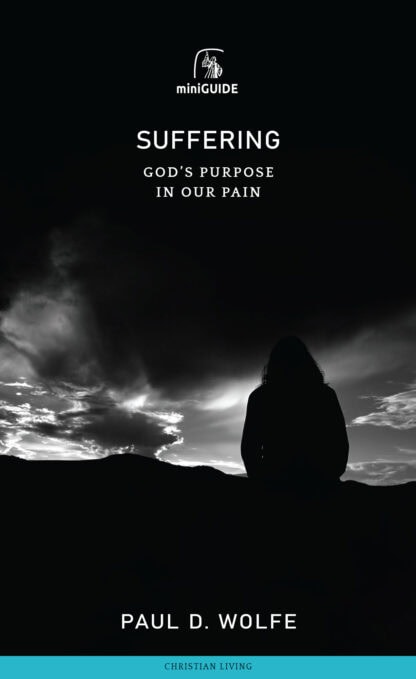
Paul D. Wolfe
Reviewed by: Chandra Mininger
Suffering: God’s Purpose in Our Pain, by Paul D. Wolfe. Banner of Truth, 2023. Paperback, 120 pages, $8.00. Reviewed by OP member Chandra Mininger.
Do we really need another book on the topic of suffering? This is the question I asked myself as I picked up Paul Wolfe’s book, so I found myself interested when the author asks the same question in chapter 1. His answer is a good one: there may be thousands of books on suffering, but there are billions of sufferers, and each articulation of gospel comfort that comes from a new vantage point may help some of them. God ordains our sufferings, and he also ordains helps along the way. Perhaps this book will be one of those for you.
The book is part of Banner of Truth’s series of Mini-Guides that are formatted to fit neatly into a Sunday school quarter (13 weeks) for group study. As their website states, the Mini-Guides “lay a solid foundation of Bible teaching while encouraging more thorough exploration of the theme with suggestions for further reading.” Accordingly, Suffering: God’s Purpose in Our Pain is a very brief survey of a large and complicated topic. Without the list of further reading at the back, I think the chosen format is too small for this topic. However, a good teacher in a church could certainly use it as a springboard, and every chapter is both clear and Christ-centered.
After discussing preliminaries, Wolfe spends a chapter addressing what is essentially the backbone of his methodology in the book, namely that as Christians we derive our life pattern from our union with Christ: suffering unto glory. The dedication to Dr. Richard B. Gaffin Jr. thanks him for teaching and exemplifying this reality. Wolfe declares that we will never fully make sense of our own sufferings without first beginning with the sufferings of Christ and understanding our union with him. He then fleshes that pattern out in each of the subsequent chapters.
The book tackles the usual litany of topics that surround the complexities of suffering, including: the spectrum of our suffering, common errors in our evaluation of its cause, God’s relationship to it, the benefits derived from going through it, and even some FAQs about Satan’s role in the suffering of Christians and about catastrophes or viruses. I think that the latter of those is the weakest and least helpful to the overall discussion.
In my favorite chapter, Wolfe discuss the beautiful reality we see in 2 Corinthians 1:3–7. Even Christ cried out to his father for comfort, and now, as our sympathetic high priest, he pours his Spirit of comfort into our lives, which we can then share with our fellow sufferers. In this way, our sufferings are not in vain and even give us a new context for ministry. This pattern provides a witness to the unbelieving world and an encouragement not to squander our opportunities to mirror the love of our suffering Savior.
The strength of this book is its union-with-Christ centered approach to a difficult topic covered with clarity and brevity. This provides an edifying overview. However, one who is wrestling with difficult personal suffering might be better served by a deeper, more nuanced book on this topic, like D. A. Carson’s How Long O Lord? (Baker Academic, 2006).
December 14, 2025
December 07, 2025
November 30, 2025
November 23, 2025
November 16, 2025
November 09, 2025
November 02, 2025
© 2025 The Orthodox Presbyterian Church